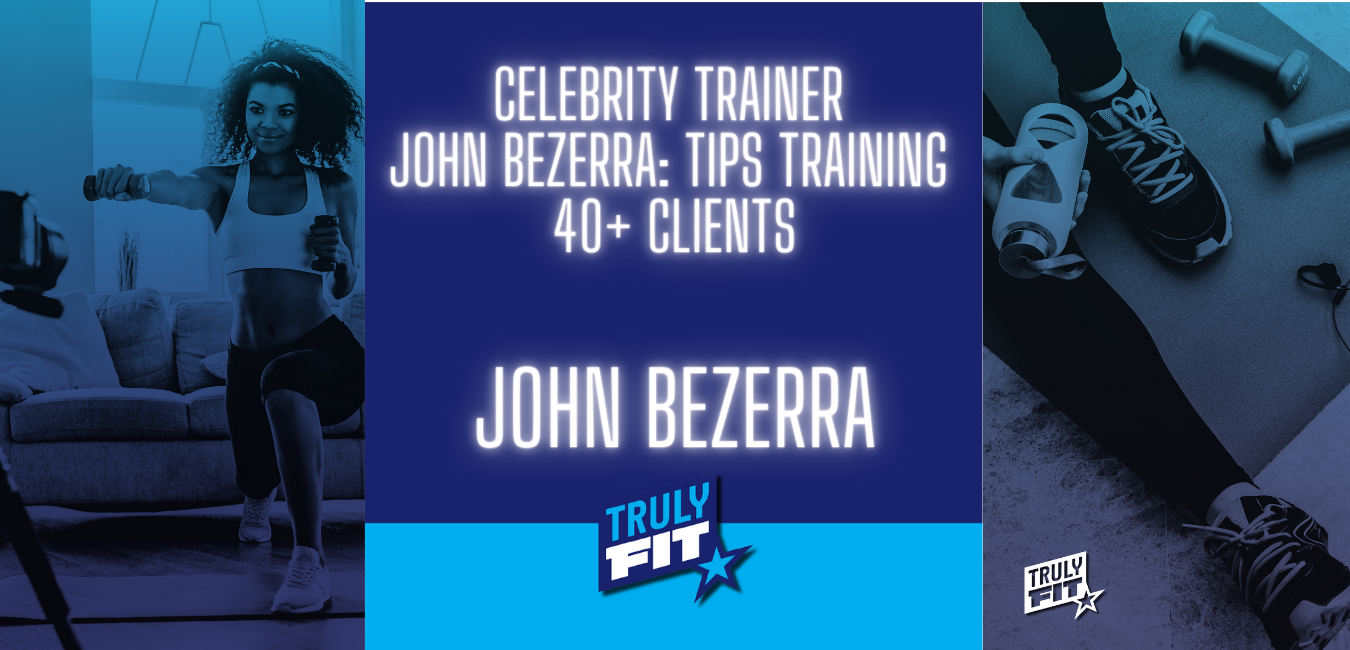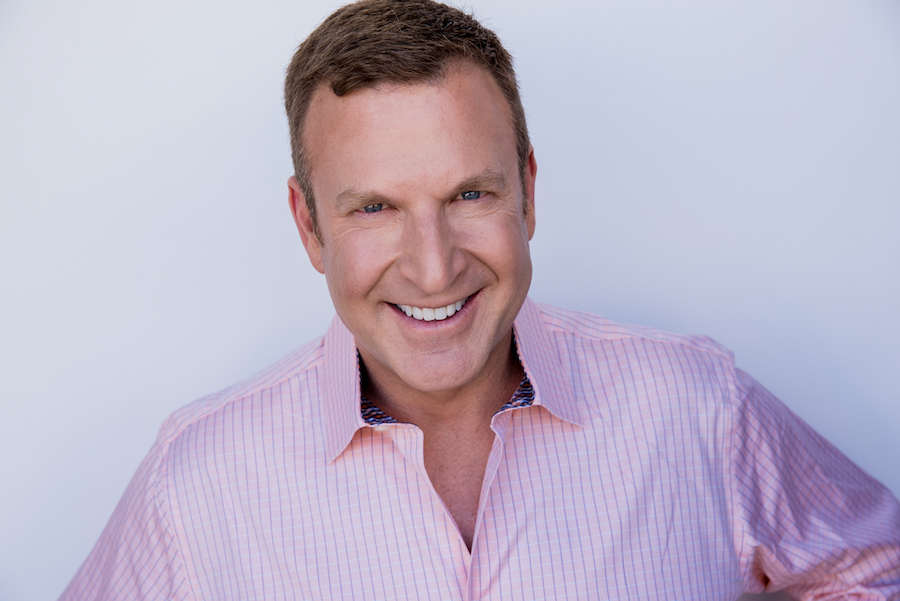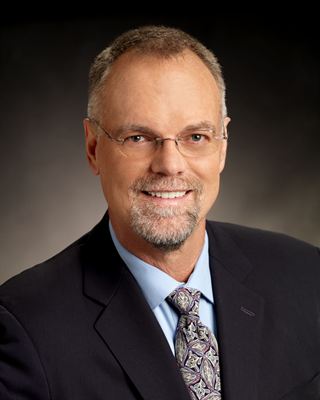
Celebrity Trainer John Bezerra: Tips Training 40+ Clients

Guest: John Bezerra
Podcast Release Date: 2/15/2021
CLICK FOR AUDIO OF PODCAST
Welcome to Trulyfit the online fitness marketplace connecting pros and clients through unique fitness business software.
Steve Washuta: Welcome to the Trulyfit podcast. I’m your host Steve Washuta, co-founder of Trulyfit and author of Fitness Business 101 today we have John Bezerra, a former bodybuilder with 35+ years in the industry. He’s a celebrity trainer. John even made regular appearances on Sons of Anarchy. John and I discuss different tips for young trainers. We discuss the physiological and psychological differences when training 40-plus-year-old clients, his new online business venture, and a host of other things. Today, we have a great one for you. With no further ado: John Bizarro.
Steve Washuta: Okay, John, thanks for being here. Let’s give a quick bio background of yourself. Let’s give it a deep dive, a delve into everything from where you’re from, and how you got started in fitness to where you are right now and what you’re doing in the industry.
John Bezerra: Yeah, absolutely. So my name is John Bezerra. I am a 35-plus-year veteran of fitness and personal training. I think I was probably a personal trainer before the word personal trainer was a word, to be honest.
I’m from Ventura Beach, California. An athlete, my whole life wrestling BMX football, and I went to college to play football, and I was going to become a doctor and I got hurt playing football.
I was at Stanford, and I hired a personal trainer to help me with my rehab. So I could take advantage of my wrestling scholarship. And I really liked what he was doing much, much more than what I was learning in medical school.
Basically, he was helping people not need a doctor. And what I was learning, I was learning to interview somebody and prescribe medication. That is kind of how I got into it. graduated with a degree in kinesiology, I got lined up with the right people, and I’ve trained some big Hollywood stars and athletes.
And some point during the journey, I’ve been in a few movies and I was a regular on Sons of Anarchy for three seasons. So yeah, fitness gives so much to me. And I’m so passionate about it that I just hope younger people looking to become a trainer really give it a second thought because I can’t think of a better job in the world.
Steve Washuta: Wow. Well, that is a pretty cool and impressive bio. Yeah, I think to remark on what you said concerning you know, medical school and your experience with the personal trainer that led you to go down that path, you know, we have a lot of leverage, we don’t have as much red tape, as you know, medical professionals, which makes it more personal, hence the personal training. And that’s something that I’ve always, really clung to.
That is why I love this industry. And you’re speaking of starting out in this industry specialties are something that people always ask about when you start in this industry. Obviously, you started in bodybuilding. Now you’ve, you know, probably moved around to a bunch of different areas, but specifically, now, you know, 40 Plus, as a clientele group, who you work with often and help. Can you explain what are the physiological differences in working with a 40 year old as opposed to a 20 year old?
John Bezerra: 40 and over, things start happening to the body, you know, obviously, just aches and pains started creeping up. But one of the main things is, you know, you’re more you have more inflammation, you have more acidity. So you got to really attack the personal training from the inside out, you know, and if you’re attacking the inflammation and the injuries and structural realignment and things like that, obviously, the outside is gonna look better, too.
So it’s, it’s a lot different. It’s just, you don’t have time to waste anymore.
As a trainer, or even as an individual trying to reach a goal, you just got to make sure all your T’s are crossed and your eyes are dotted because quite frankly, you’re running out of time, you know, and it’s the second half of your life.
So you just got to make sure that the program that you either put a client on or you find for yourself, is making you move forward every day and not backward. If that makes sense.
Steve Washuta: Yeah, yeah, that does make sense. I think I would say, younger personal trainers for people starting out in the industry, I think it’s important to have clients who are over a certain age because you start to learn that your clients now even if they are not that age are eventually going to have set issues and injuries. So you have to prepare them for that it also makes you be very creative in your approach. because inevitably you’re going to have people who come to you who say hey, I’m you know, 63 years old, I have a knee replacement and a bilateral hip and I have tendinitis in my elbow and I want to exercise. So you know, I think learning that from the start isis really important?
John Bezerra: Absolutely. You know, and to kind of touch on that a little bit more, I have four apprentices that I work with right now, they’re kind of in my mentoring program, and all of them under 30. So the one thing that I started teaching them is train your younger clients as if they are over 40.
When you do that, you’re not going to create that collateral damage, as you typically would, you know, and, and I think that’s like you said, it’s an important thing to address.
You know, a lot of trainers, just don’t listen to their clients.
So, you know, if you’re a trainer, you need to make sure you’re really listening to your clients. And the biggest mistake I see in training is a lot of newer trainers train their clients like they train themselves. I’m sure you’ve seen that more often than not as well.
Steve Washuta: Yeah, yeah, that is a big mistake. I think there is a subset of trainers who get into the industry, specifically because of that. That’s not a bad thing. But you have to be ready and willing to adapt and adjust. Because the people who are coming to you, more likely than not, do not have your same goals, especially if you’re 24 years old, and your clients are 54 years old.
John Bezerra: Exactly. Yep. You got it, you can never stop learning, right? I mean, you know, the day you think, you know, everything or stop learnings, the days stop growing?
Steve Washuta: That’s right. So what are the psychological or social differences and working with somebody who is over 40? To you, you know, when you’re working with your younger trainers who were in their 20s and 30s, and you’re mentoring them? Do you kind of give them some insight into how to deal with older clients from that perspective?
John Bezerra: Yeah, I mean, for sure, and then, you know, just the psychological part.
It’s really, it’s really strange, I’m really pleased with what my over 40 clients do. I think it’s just the point where you get somewhere in your life, and you’re just sick and tired of being sick and tired.
So I believe that you know, someone in their 40s and above has just kind of went through the life struggles and, and realize that you know, life might be getting shorter. So, their focus is a lot better typically than a younger clientele.
As a trainer, we’re kind of therapists, too. So everybody has an individual personality, and you just kind of got to learn to mirror that personality and know how to talk to the person.
Part of being a trainer is not just the workouts and the nutrition, it’s sometimes it’s taking them off a ledge, you know, they’re ready to give up, they’re frustrated.
You just have to be kind and have empathy for him and understand, listen to them, and then just get them back on path. And that’s a bigger part of personal training sometimes than the actual physical aspect.
Steve Washuta: Yeah, yeah. And I’m going to shamelessly plug my book now Fitness Business 101, the subtitle is, what the certifications don’t teach you.
And a lot of the book is just about that.
It is all about the psychological component that, you know when you’re done reading your national academy of sports medicine or your Ace book, you don’t get any of that information, right.
Not until you’re on the floor, and you’re working with people day to day, you don’t understand that there’s going to be a client who comes in and says, Hey, Steve, you know, I, my son or daughter was up all night crying.
I have a toddler, I’m on very little sleep right now, I don’t really want to work out and you have to be there for them, you know, psychologically, and have a moderate day or a light day where they’re still working out because they need those, those hormones and those stress relief, things ignited in them.
But, you know, obviously, that wouldn’t be a day in which you push them to their limit. So I think there’s a big you know, there’s a very important part about having a mentor like yourself so that the younger trainers can learn that in advance and not make those mistakes.
John Bezerra: Yeah, absolutely. And good for you for writing that book. Because you’re right, the cert I mean, certifications are a dime a dozen, you know, someone listening to this, if they’re thinking about being a trainer, you could pick one of the hundreds of certifications, he could be certified by tomorrow, you know, so there’s so much more to personal training than just getting that certification. And I can’t remember I’ve got I think 20 I got my degree in kinesiology but I also have like 26 certifications from Ace to ISSA to NASA and everything. And I can’t remember any of those certifications ever talking about mindset, right?
Steve Washuta: Yeah, none of them do.
I think they might have like, you know, continuing education courses that touched on it, but they’re not done well.
I’ve had so many young people who I’ve taken under my wing who come in and they are three times as educated as I am.
They come in With a master’s in Kinesiology and they have 1000s of dollars of certifications, yet, they can’t, they can’t host for lack of a better term, a good personal training session, because they don’t have a good idea of the ratio in which you should be talking to a client, and the ratio in which you need to be demonstrating and how you need to be verbal cueing sometimes, and they don’t understand the mental side of the game, either.
So it’s, um, you know, it’s something that, that this is a reason why I’m doing this podcast and having on people like yourself is to spread this information to young trainers, so that, you know, people like you and I, who might have struggled for two or three or four or five years falling into the sand traps in the industry, they can kind of circumvent that and make money quickly and be a better trainer quicker,
John Bezerra: right? Absolutely. You know, and just to kind of touch on just this similar topic that I just had an online client, I just signed up yesterday, literally yesterday, and she had hired a trainer off, shout him on Facebook.
A local guy, fitness model, you know, very aesthetic, looking at a lot of clients.
She was so frustrated because he was actually mean to her, you know, and she had bone on bone in the knee and bulging disc, all kinds of issues.
He was she was telling him, you know, this hurts when I do this, and he was just, well, it shouldn’t hurt, it shouldn’t hurt.
And then he made her do some kettlebell swings that hurt her back. Then she was I can’t do this, he grabs a kettlebell out of her hand. I was just blown away by that.
If you are an up and coming trainer, think about being a trainer, you’re working for this person, this person is hired you to make them look and feel better.
And you know, sometimes the event so, you know, be careful what you’re saying to your clients, listen to them and have empathy, but good god there, you’re not doing them any favors.
Steve Washuta: Yeah, that’s that is I’ve seen it too many times. And that’s great information.
I think part of that is because if the said trainer doesn’t know what to do next, of course, they’re going to be agitated.
And that’s how they’re going to respond. But if you’re a good trainer, you’re going to have endless modifications.
And you’re also not going to be you. We can’t take it personally, right? If you set your client up in a position, and it’s hurting them, even if you know, anatomically speaking ish, it shouldn’t be hurting them or you think it shouldn’t. They’re not lying to you, it’s time to move to movement.
John Bezerra: No, and you know, you could have the most book education on the planet, practical experience, but there are injuries that are going to come up that literally don’t make sense. They just don’t, you know, and everybody’s individual. So it’s, it’s a matter of sometimes just working around those injuries, you know, and working on alignment, but not everything makes sense. You know you have to, but you can’t know everything. There’s no one on this planet that knows everything. And for sure I did. Oh,
Steve Washuta: yeah. No, that’s, that’s another good point. And speaking to that, I think there’s a lot of trainers who, you know, we are problem solvers. We like to fix things we look at the body I call us, you know, we’re anatomical sleuths in a sense and we’re trying to figure out the problem and see how we can potentially help fix that problem.
But there is a point in which I don’t want to say you have to give up but you have to then send that person somewhere else when our expertise runs out. So that’s why networking is so important having a physical therapist that you know or a sports medicine doctor or whoever that next level professional is where you don’t need to play no at all you can say you know what, I’m sorry Susie but this is above my pay grade and but I want to send you to x y and z and then that referral will inevitably come back to you down the road.
John Bezerra: Yeah, absolutely.
It is known as you may be and something like that comes up it’s not an occupation where you can fake it you know it’s not fake it till you make it if you don’t know to be honest about that right don’t try to pull the wool over rising purdham worse
Steve Washuta: Yeah, no, that’s right. I’ve seen it too many times. you said it’s we’re not in that occupation where you can fake that information until you make it because then your client gets injured and not only obviously is that bad for them, but also for your long term.
When you walk into a facility and your first week on the job you want to be known as the guy who hurt you know Mrs.
Struthers you’re going to be in trouble find out.
John Bezerra: Exactly.
Steve Washuta: So let’s talk about I know this is random but I wanted to see you know, a lot of people 40 plus At the end of the day, they might come home and decide you know what, I think I want a glass of wine or I you know, I deserve my high ball of whiskey and things of that nature is there. Do you touch on some sort of alcohol and training and goals with your clients? How much is that? Does that work into your, your, your day to day conversations with them?
John Bezerra: Absolutely. So when I started to do a consultation, and literally, I have it in front of me, and the 11th question is alcohol consumption. And you know, there’s the busy professional, or maybe they have a few young kids that when the kids go to sleep, a bottle of wine comes out, and you know, it, it has a detrimental effect in not only calories, but in a sense, you know, too much alcohol is a poison. So we always do touch on that. been pretty fortunate lately, where I’ve just had mostly social drinkers where it’s maybe once a cup a couple every two weeks. But, I mean, that is an issue.
And, you know, I am very frank with my clients, you know, after we figure out kind of where their macro goals are, and we put the workout to kind of work cohesively with that, you know it . My thing is, is if you follow this program, 100%, your results are going to be there. If you vary from it, you know, if you want to have that cheat meal, or if you want to have that, you know, drink of alcohol, it’s gonna slow us down. So yeah, I mean, we do touch on that literally, before we even start. And it’s a, it’s a concern, especially in the last 11 months going through the pandemic, I’ve seen, you know, a lot more alcohol usage to
Steve Washuta: Yeah, that’s exactly that’s, that’s why I asked that question. I know, it’s, it’s sort of gone up, I can tell with my clients who, you know, may not be hitting particular goals, they alcohol, I think what they don’t understand is, it’s not just a caloric thing with the alcohol, they’ll say, oh, it only has I only had three beers, and it has this tick. Well, you know, there’s also, you know, metabolic effects and hormonal effects, and then you’re not sleeping properly, because now you’re up at night, and that has more, you know, that there’s the snowball effect from these things really hinders progress.
And I think that that’s sort of a this is a kind of a PSA to any trainers listening, and I understand you need to let your clients know that if they’re not meeting their goals, and you think that alcohol is a problem, explain to them that it’s more of a problem than they may think as far as it just being a caloric issue.
John Bezerra: Oh, absolutely. Just to think about, like, for my needs clientele, the over 40, is, you’ve got to worry about your organs, you know, and your filtration systems. And, you know, most everybody, by the time they’re in their early to mid-60s have some type of kidney disease, you know, it’s just literally wearing out. And, you know, unlike a car, we can’t take ourselves, in turn, change our filters. So you need to be concerned about what you’re putting in your body and how it’s going to age your organs.
Steve Washuta: Yeah, now that’s great info.
I think when you’re dealing with the older clientele, you’ll hear these terms like degenerative disc disease, which just basically means I’ve gotten older, right? We’re all of our desks are wearing down at some point. And we have ahead of that game.
So can you give me some information? Or I would say, What is your background in dealing with men over 40, who have transitioned to using TRT, which, for people listening don’t know what that stands for. It stands for testosterone replacement therapy.
John Bezerra: Okay, so I mean, that’s one of the up until recently, it was a very gray area, you know, not only in anti-aging but also in sports. And I kind of just laid lay that on the line. So I mean, hormones are a real thing. You know, they do have something to do with the way you’re aging. And you know, when you see men by the time they’re in their late 20s, they test all tawse testosterone levels are decreasing. Women have a little bit more hormonal fluctuation fluctuations, and we do, but that’s an individual thing.
So I explained to them what that is, we try to address it with nutrition first.
I always leave it in the client’s choice to you know, get those levels checked, if they’re extremely low. And we cannot improve it through nutrition, because there are some tricks you can do with nutrition and sleep and, you know, reducing your stress levels and different foods you eat where you can increase that.
At the end of the day, if we can’t increase that, then that’s on the client’s hands because as a trainer, it’s still kind of a gray area, you know, but that being said, hormones are real, and they do affect us, you know.
When you go to a general practitioner, they’re going to give you you know, they’re going to test your hormones are going to give you averages for your age.
And averages for your age may not necessarily mean fitness levels if that makes sense. They’re just saying okay, you’re 63 and this is the average range for your age, does that mean that your fitness levels will be affected positively from it? Probably not.
So, I mean, there are so many different levels to that question that, yeah, I just address it in that manner. And at the end of the day, when they talk to their doctor, they can make that decision, whether they want to move forward with TRT therapy or not.
Steve Washuta: Yeah, I think that’s that makes a lot of sense, and thanks for giving me, the listeners that information I think it’s because like you said, it’s, it’s new. As far as it is out to the general public, right, you can go to these clinics, you can get it easier, everyone knows that it’s, it’s a bit more prevalent than it used to be. I don’t think my grandfather was looking for TRT, but but but now now it is. Now we’re just in, in the population. And it’s just important, I think that we know our clients are on it, not that we tell them to go on it or not because it does change the workout potentially in effect in an advantageous way.
You know, some of my clients who have hopped on it, I can tell all right, well, you know, now we can push things a little bit more your you can eat a little bit more, we can up these weights a little bit more provided, that’s their goal, right? To get stronger, or build muscle. But yeah, that’s good information there. Do you have any recent connection to virtual training, obviously, with the pandemic, everyone’s business has changed. It’s hard not to see the, you know, the inevitability of training, becoming a sort of a dual business model. Now do what is your recent connection to virtual training, if any job,
John Bezerra: so it’s really bizarre and in for lack of better words, you know, you always hear that phrase, being in the right place at the right time, I started looking into and educating myself on virtual training online training, just about a year ago. And it was literally right before the pandemic started. So I’d already kind of started wetting my feet. And I like it.
Because you know, when I’ve worked with celebrities and stuff, I’d either have to train them on location or at their house, I did a lot of traveling. So now with the online being 53, how many years Can I physically do that? How many years Can I spend 10 hours in the gym five, six days a week, it’s coming to an end? So what the virtual training allowed me to do is, you know, I’m in my house right now talking to you. And, you know, I have about, I think about 65 clients online right now.
It’s been, it’s been quite refreshing, you know, I get to meet people all over the world, I’ve got clients in different countries. And the really strange thing, and I don’t know if you find this, but I almost feel like my online clients are getting faster results. The only thing I can think of is sometimes when a person goes to a trainer’s face to face, they believe that you know, they go in, they do their hour, hour-plus workout.
That’s it. I think they think the magic parts of the gym, where the online clients are a little bit more in tune with the nutrition part.
And it looks like for me, I’m probably less than a year, I’ll be fully virtual.
Steve Washuta: Wow. . But that’s, that’s really cool. And really good to hear that you’re able to transition that quickly, in one year, potentially, to being yet fully online.
John Bezerra: Well, and another there’s the flip side of that story. So we all know, there are some very Instagram famous trainers that make tons of money, and good for them. But the one thing that I won’t do is I won’t jeopardize my brand quality by doing just template stuff. And a lot of trainers are making a lot of money because they’ll do all their Instagram stuff. They have millions of followers and they’ll have hundreds if not 1000s of clients, but they’re literally sending every single client the same workout and diet, you know, and is where it can you make money that way? Sure.
But I personally just I can’t do that, you know, I don’t want to jeopardize my brand. I put a lot of effort into my online clients, you know, we make them send food pics every meal.
Instead of a log, and because a lot can get lost in translation if they’re writing it down, they can’t really fudge a photo.
So I do photos of all the food pigs. I keep a diary on all that stuff. So as we move forward with nip plateaus, we can go back and adjust. So I do put a lot into it.
There are great trainers, and then there are awful trainers, you know, and if you are a trainer and you’re up and coming, really make sure that your clients get more value than the money they’re spending really important.
Steve Washuta: Yeah, that’s great information, I think to you know, just to piggyback and add to that, there’s so much information out there too, about getting clients. And there’s not enough about keeping clients and you don’t need to know that much about getting clients if you know how to keep them. Because, you know, there are only so many hours in the day, even with the scalability of online, you know, your word of mouth will always be your best feature, your best advertising feature. And if you’re going to spend all of your time trying to be a marketing and advertising professional, you’re not spending enough time becoming a very good personal trainer and helping your clients, which is the purpose of why we got
John Bezerra: absolutely and you know, being even starting at face to face. And if you’re young, and you get you’re going to have a core group of clients, and what a core group of clients is, it’s the clients that are going to be with you forever. And you could literally run an entire career in personal training five core clients, you could get enough referrals over the years off those five core clients to support you for the rest of your career.
So yeah, I mean, make sure that you, you got to treat your clients the same, you got to treat them like they’re the most important person in the room, you know, and if you are a trainer, don’t be on your phone while you’re training clients don’t be eating your meals when you’re training clients. Your only focus the only thing in the world is that person in front of you at that given moment.
Steve Washuta: Yeah, that is that is fantastic information. I think there are a lot of trainers if they haven’t had the luxury of either having a mentor like yourself or working in a facility where someone took them underneath their wing, they might only see other young trainers who are doing those things you just said who are telling clients Hey, give me 10 minutes.
You just go back on the treadmill, I gotta go, you know, eat my meals, because I’m concerned with my macros because I’m trying to get 10 pounds or Yeah, like, I can I take a picture of you while you’re doing this movement. It’s for my Instagram. Meanwhile, their client has, you know, max weight on a deadlift, and they’re not concerned with their form.
John Bezerra: See that every day? Right? It’s, it’s insane.
Steve Washuta: Yes, I almost wish it was banned.
I almost wish that I know, it wasn’t a facility I worked out. They didn’t allow trainers to bring their phones on the floor.
John Bezerra: Yeah. That’s just good. That’s good business. It’s super rude to your client. And, you know, I mean, most of us that are at the top end of the game are charging nor sight of $100 an hour. You know, if I’m paying $100 for an hour for something, I want your complete attention.
Steve Washuta: Yeah, good. I couldn’t agree more, even if I’m paying half of that I still want your complete attention even sure, yeah. And no, your classes. Now. I mean, I’ve seen a bunch of classes that are, you know, upwards of 30 and $35, people are paying a premium for fitness.
And that means that you’re competing with a lot of other people, and they’re paying top dollar.
You need to treat your clients, you know, with the utmost respect that you would think would be a norm, but unfortunately, I need to be told that.
John Bezerra: It goes into just kind of where the world went. And, you know, I was talking to my fiance about how bad customer service has got gotten in general.
I mean, something has to be done.
They were you know, we as a culture, we’re not nearly as polite as we used to be, you know, we’re all rushed. We don’t take the time to, you know, engage with people.
I opened the door for a lady at Starbucks not long ago, because that’s the way I was raised. And, and she goes, You know, I can open my own door. Thank you very much.
What’s happened to the world?
Steve Washuta: Yeah, you’re right. People will find any reason to be a little bit on edge nowadays. That’s, you know, speaking of what you just said, I was a little hesitant to go online initially and switch the business model over mainly because, number one, I enjoy the personal aspect of personal training, being there seeing my clients, I was a bit concerned with a physiological aspect, can I, you know, I can’t walk around them in a 360 degree like I otherwise would be able to.
Am I going to miss things, you know, you know, and you know, aesthetic-wise, can I not see what’s going on with their hips in certain positions because of the camera, for instance.
I’ve found a positive I’m very surprised pleasantly surprised, I should say about all of the advantages that I’ve really felt I’ve been given with this online and I do think too, I think people take the time more seriously in some respects.
And that they’re putting the work in on the other ends. It’s, it’s it really is working out. And I’m glad that you find that as well in your business.
John Bezerra: Yeah. Thank you likewise.
Steve Washuta: Yeah. I really, really appreciate your time. It’s great information for all the young trainers out there. And I want you to give us a plug on some of your stuff.
Where can people find more information about john and your training or just get in touch with you if they’re maybe young trainers who want some more information?
John Bezerra: Yeah, absolutely. So my website is johnbezerrafitness.com. My name is spelled JOH, N- B, E, Z as in zebra, E. R R A. And on my Instagram, it’s johnbezerrafitness. We are launching a school- we’re filming it now- we’re launching a school in the next two months.
It is exactly what we’ve been talking about. It’s how to take on person to personal trainer and transition to online.
So that’s pretty exciting. Just because I’ve had such great experience and great results, I know there are a lot of trainers struggling to learn and know what to do.
We’re gonna put a school together to help them do that. That’s called FreedomTrainerAcademy.
The websites coming soon. But yeah, that’s it. johnbezerrafitness.com, Instagram is johnbezerrafitness. You can reach me through both of those. I hate to say the word Google. You can Google me and some see some of the things I’ve done in the past as well.
Steve Washuta: Awesome. It’s great to have somebody like you John, who has been there and done that everything in the industry for 30, 35 plus years, is it?
John Bezerra: I think this is my 36 I’m starting to lose count now.
Steve Washuta: Unbelievable. Well, thank thank you again, John, for hopping on the Trulyfit podcast and I’m sure we’ll talk soon.
John Bezerra: Absolutely. Thank you so much.
Steve Washuta: Thanks for joining us on the Trulyfit podcast. Please subscribe, rate, and review on your listening platform. Feel free to email us as we’d love to hear from you.
Thanks again!

CLICK FOR AUDIO OF PODCAST




